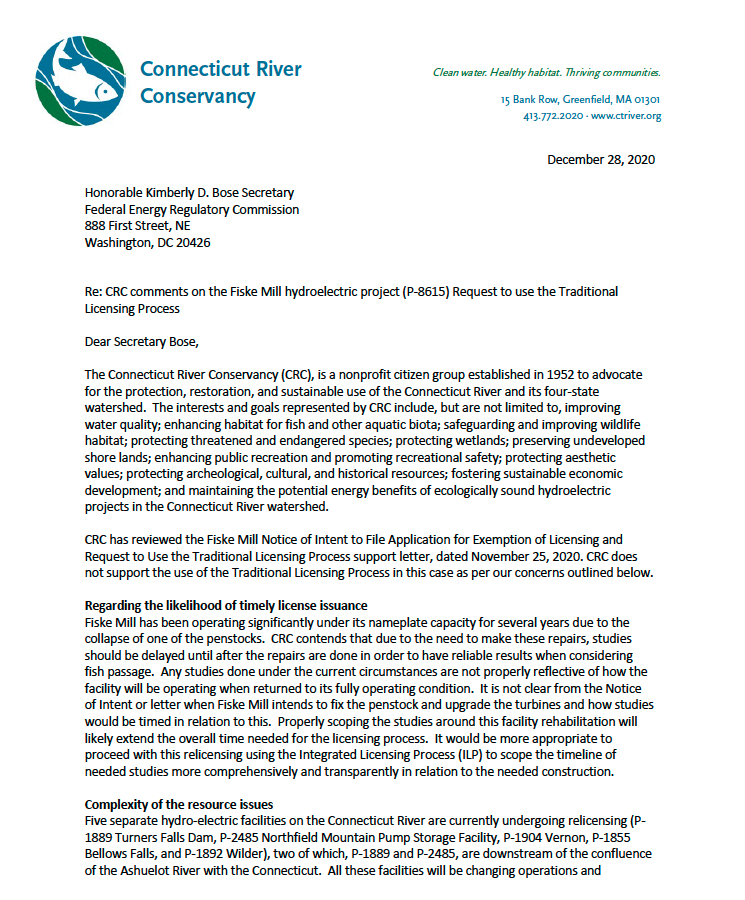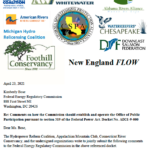These comments from Connecticut River Conservancy request the denial of the Traditional Licensing Process (TLP) for the Fiske Mill Hydroelectric Project (P-8615).
Deny Request to Use the Traditional Licensing Process
Fiske Mill mistakenly sites the ILP as “an alternative licensing process,”6 undermining the long andcomprehensive rulemaking process in 2003 where FERC ruled that it would henceforth function as thedefault process, expressly because it, “addresses … the problems that participants in licensing fromevery perspective have identified with the traditional process. It merges pre-filing consultation and theNEPA process, brings finality to prefiling study disputes, and maximizes the opportunity for the Federaland state agencies to coordinate their respective processes.”7
In its final rule FERC concluded that, “five factors are most likely to bear on whether use of the traditionalprocess is appropriate.”8
CRC contends in the case of Fiske Mill that:
- it is unlikely that a timely license would be issued for this project under the TLP as there may be disagreement on number and extent of studies that are needed;
- the complexity of the resource issues as they relate to endangered and migratory species for this facility warrant the ILP;
- there is some level of anticipated controversy based on the history of lack of effectiveness of this facility to generate electricity, relative unresponsiveness of the applicant to fish passage requirements, and its location upstream of the confluence of the Connecticut River and the dynamic changes occurring downstream;
- there may be a general disagreement about the amount of available information specific to this project and there is a potential for significant disputes over studies, and
- given the concerns above, that the assumption that the relative cost of thetraditional process would be less than the integrated process may not be the
CRC requests that FERC deny the request to use the TLP process for Fiske Mill Hydro. We strongly feelthat the default ILP process is more appropriate in this case. The formal timeframe of the ILP allows for more comprehensive public participation in the process and allows for all stakeholders to be informed equally as the process unfolds. Additionally, early scoping of studies creates more comprehensivesources of information before the license application is submitted. The presence of dwarf wedgemussel in the river upstream of the project area and the significant consideration of resource needs for multiple migratory fish also supports the use of the ILP to ensure appropriate Federal coordination between FERC, NOAA, and the U.S. Fish and Wildlife Service. Given the Connecticut River watershed as anecosystem and the fact that this dam is the first obstacle up-river of the Connecticut River, locatedbetween two Connecticut River project facilities that are currently undergoing relicensing under the ILPprocess, CRC requests the use of the ILP.
Additionally, as this Notice of intent is seeking a FERC exemption, this may be the last possible opportunity for a comprehensive analysis of how Fiske Mill project operations affect the Ashuelot River.CRC feels that it is imperative that a very structured and thorough relicensing process with appropriately scoped comprehensive studies and ample public participation, namely the ILP process, take place to ensure protections of the resource under the coming license, especially if it is the last opportunity to do so.
Resources
6 Fiske Mill Hydroelectric Project No. 8615. Information Supporting Default Traditional Licensing Process. November 30, 2020. Page 4.
7 104 FERC ¶ 61,109. United States of America Federal Energy Regulatory Commission. 18 CFR Parts 2, 4, 5, 9, 16, 375 and 385. Docket No. RM02-16-000; Order No. 2002. Hydroelectric Licensing under the Federal Power Act. Issued July 23, 2003. Page 13.
8 Ibid. Page 16.


 HRC or member-contributed
HRC or member-contributed